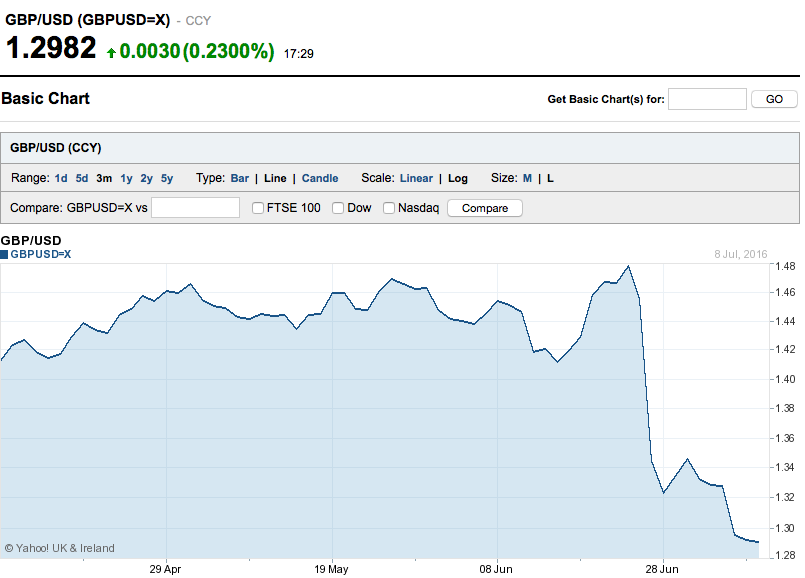In the wake of the decision to exit the European Union, many remaining members angry with the UK vote to leave have harbored resentment, threatening diminished trade relations and other forms of punishment in response. The animosity was no clearer that the first meeting of the European Commission during which President Jean Claude Juncker made his disappointment widely known, chastising the UK members present for the proceedings.
The referendum vote has managed to split Europe down the center, with certain members calling for greater integration while others are contemplating holding referendums of their own to consider the future membership. However, for the UK, nothing has moved forward on the planned “Brexit” yet considering the government still has to trigger Article 50 of the Lisbon Treaty. However, in the meantime, the lack of progress has thrown the UK outlook into turmoil, reflected by the continued GBPUSD tumble.
A Nation in Upheaval
Since the tallying of the referendum results, the UK government faces numerous challenges following the resignation of key members, including Prime Minister David Cameron who plans to step down later this year, paving the way for the next Prime Minister to activate Article 50. Aside from the high profile resignation of Cameron, Nigel Farage, formerly of UKIP also relinquished his role alongside Boris Johnson, who was a major campaigner for the “leave” vote.
This has put the Conservative party in disarray, however, no more than other major parties such as Labor which is currently pushing to oust leader Jeremy Corbyn. The mess unfolding in the UK politics is already bleeding into the economy as the changes give way to greater uncertainty about the outlook, leading to pressure on property prices across the nation, echoed in large part by a significant drop in the Pound.
Since the vote, the GBPUSD pair has fallen from as high as 1.5020 reached during the day of the vote to as low as 1.2796 last Wednesday, marking a -14.80% drop to the lowest exchange rate witnessed in decades. The significance of the state of uncertainty prevailing across the economy has been widely reflected in the Pound, which is adjusting to the new realities of a changing relationship with its largest trading partner.
The growing calls for punitive actions against the UK for its decision could greatly harm this close relationship and furthermore strain already frayed political ties. However, the European Union itself is also greatly divided, with some hailing the UK decision as a vote for political independence and sovereignty instead of servitude to Brussels. A recent report from the IMF underlines these issues, with the UK’s exit leading to renewed fears of an EU breakup.

BoE’s Carney Acts Quickly to Soothe Fears
Although UK financial markets have been a whipsaw of activity since the vote was cast to leave, the Bank of England stepped up quickly to quell the volatility by extending its own guarantees to the financial system in the form of a pledge to provide liquidity assistance of GBP 250 billion. However, speculation of a rate cut is rising, as economists renew calls for further monetary policy accommodation.
The Monetary Policy Committee is expected to release its decision on Thursday with expectations ranging from rates staying on hold at 0.50% to a 25-basis point cut to 0.25%. Looking further out, forecasts are for rates to fall to between 0.00-0.25% by the end of the year, adding to the downward pressure on the Pound as rising uncertainty begs greater monetary intervention. Although hovering above multi-decade lows, GBPUSD could easily break substantially lower should a rate hike come to fruition this week.
Outside of monetary policy measures intended to restore confidence in the UK economy, the Government is also working quickly to build back credibility, with Chancellor of the Exchequer George Osborne acting to reduce corporate taxes. According to his latest plan, Osborne intends to bring down taxes from 20.00% to below 15.00% in an effort to help restore competitiveness in a post-EU UK economy.
Osborne’s plan will help woo businesses looking to benefit from the lower tax rates in the globes financial capital, but it may eventually come at a price. While the rapid depreciation in the Pound should help trade due to improved export affordability, should trade relations with the major partners sour, it could bring about greater economic protectionism that actually reduces the attractiveness for doing business with the UK.
Trade Protectionism on the Way?
One of the ways the Brexit decision may backfire on the UK is increased trade restrictions with major blocks like the European Union. With certain members such as Belgium calling for retaliatory measures to punish the UK for its decision, it could turn into greater tariffs for UK goods in Europe, a move that would likely be met with similar measures from the UK. Trade protectionism is not necessarily just a European phenomenon, but also an idea with growing popularity across the Atlantic in the United States.
The main issue with trade protectionism is that it can reduce investment alongside flow of goods and services across borders, raising the costs of doing business. This could hurt output across the UK, with any sort of trade restrictions further weakening an impaired economy. With these looming possibilities on the horizon, risks remain skewed to the downside for the GBPUSD pair.
Tradersdna is a leading digital and social media platform for traders and investors. Tradersdna offers premiere resources for trading and investing education, digital resources for personal finance, market analysis and free trading guides. More about TradersDNA Features: What Does It Take to Become an Aggressive Trader? | Everything You Need to Know About White Label Trading Software | Advantages of Automated Forex Trading





































